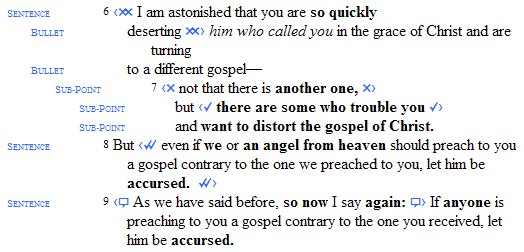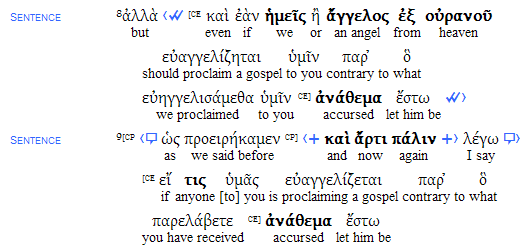This post is the second installment in the series on meta-comments, based on a paper that I will be presenting at the ETS annual meeting next week. If you did not read the introductory post, I would encourage you to do so. Meta-comments are one of about 20 different devices that are annotated in the LDGNT. If you have not looked at this resource before, there is a brief video on the product page that provides an overview. Here is the glossary definition:
Meta-comments: When speakers stop saying what they are saying in order to comment on what they are about to say, speaking abstractly about it, e.g. “I want you to know that…”, “Don’t you know that…”
When people speak, they spend the majority of their time communicating what they want you to know. However, at times they step back from the actual topic and make a comment about the topic like:
- “It is very important that you understand that …”
- “I want you to know that …”
- “Don’t you know that…”
- “Of all the things that you have learned so far, the most important thing is that…”
- “If you remember nothing else that I say, remember that…”
Meta-comments are used over 300 times in the NT. In each case it could have been omitted without substantially changing the content. In other words, meta-comments are an extra element the writer has chosen to use to accomplish a certain effect. The effect of the meta-comment is to slow down the flow of the text in order to attract the reader’s attention to some important proposition that follows.
In the book of Galatians, Paul skips the formalities of an introduction and prayer of thanksgiving, getting right to the point. Here is the text from the LDGNT.

Note how he begins: a series of negative statements describing what kind of apostle that he is not before finally coming to what kind of apostle he is. Based on Brother Rico’s research on ALLA, this conjunction introduces information that corrects or replaces some aspect of what precedes. In this case, the positive statement is introduced by ALLA, signaling Paul’s intention for it to replace or correct the negated elements. The silhouette symbol notates “characterization”, whereby an overly specific expression is used to refer to Paul. The “not from men…” has not been included to disambiguate which “Paul” is writing the letter. The same holds true for over specifying the Father as the one who raised Christ from the dead. This longer referring expression is not intended to have us say, “Oh, THAT is the father he was talking about, I wasn’t sure which one.” This information serves a thematic purpose of characterizing Paul and the Father in a specific way in this specific context, based on where the discourse is headed. The X marks the beginning and end of what functions as a counterpoint (see glossary), providing a backdrop to contrast with the point that follows, indicated by the check symbol.
Let’s jump down to verse 6, where Paul gets to the heart of the matter, taken from the English version of the discourse database, the HDNT.

The double XXs in v. 6 signal a paragraph-level counterpoint, which has a corresponding “point” beginning in v. 8, signaled by the double check. And what do we find? Paul has marked the point with ALLA in Greek. His main point is not that he is astonished about their deserting the gospel, but the command about letting the perpetrator be accursed. There is another point-counterpoint set embedded within the larger one in v. 7, giving two views of this new gospel that the Galatians have followed. The “new” gospel is not the problem, as it isn’t really a new one. Instead (ALLA) the issue is the troublers that have come in. This is the standard replacement/correction use of ALLA, where there is a negative statement corrected by a positive one introduced by ALLA.
Don’t miss the changed reference to refer to the one who called you, which provides more thematic highlighting. Why not just say “God”? Changing the reference forces the reader to think about a specific quality of God, not just the person or entity itself. He is not just the one who sent Jesus, but the one who also called us. Why would we ever consider leaving the one who called us? We might be able to turn away from God. This name can sound pretty distant. It is something different to think about walking away from the One that called me, that called you. This makes it a personal thing. This change is a case of stylistic variation, it fits with the appeal to the heart that Paul is making. It is all inspired and profitable.
Verse 8 provides the main point of this paragraph, replacing or correcting the the content of vv. 6-7. No matter who it is that might suggest following another gospel, the Galatians are not to follow. Verse 9 is where we finally hit our meta-comment. I understand this to be something akin to our saying, “I am going to speak slowly and use small words so you don’t miss this: if anyone is preaching…” Note the similarity in the content between vv. 8 and 9. The primary changes in Greek are in the subject of the conditional “if” clause. Instead of “we” or “an angel from heaven” in v. 8, v. 9 more inclusively states “anyone”. Here is the text of the LDGNT so you can see that the statements are virtually identical.

There was an older study Bible, I do not remember which, that understood from the “what I said before I say again” to imply that Paul was making reference to some previous letter that we do not have. Maybe, but highly unlikely! Paul is doing the lingustic equivalent of grabbing them by the cheeks, getting in their face, and telling them to get a clue. Okay, not exactly, but you get my drift.
The meta-comment is pretty amazing on its own, but it is much more compelling when understood as part of the larger discourse. Paul opens the letter by stating what kind of apostle he is not, setting the stage for later defending his apostleship. It is not from men or through men, ALLA through Jesus Christ. This is the basis of his authority, the basis for the claims that he makes in vv. 6-9. It is not based on his own authority, nor derived from men.
In vv. 6-7, Paul goes out of his way to describe the thing that the Galatians have been duped into following. It is not even a real gospel, but more a matter of people coming in to trouble them. No matter who it is that advocates following a different gospel–even an angel, the least likely possibility–he is to be accursed. Verse 9 is the restatement of the same information to reinforce the same point, to speak slowly and use small words.
If you want to learn more about these concepts, I spent my summer writing an introductory discourse grammar. Each of these concepts is discussed, beginning with how the classic grammarians like Robertson or BDF treated the issue. As you read their comments, it becomes clear that they understood most of these issues, but lacked a suitable framework to describe them. Discourse grammar provides that framework. There is a sample section of the grammar available here, about 25 pages. Check out the Publications page for full papers and articles that I have written if you want some more reading material. I will add the full meta-comments paper to the page after the conference.
Isnt’ grammar wonderful?

[…] This resource was produced by Logos Bible Software. In today’s post he explains meta-comments using Galatians 1:9 as his example. It is an interesting post showing the nice layout of the LDGNT. I don’t think anyone could […]
[…] And then Steve Runge, in his wonderful new blog NT Discourse, has posted a fantastic discussion of meta-comments as related to Galatians 1:9. I look forward to the rest of his series on this […]
[…] And then Steve Runge, in his wonderful new blog NT Discourse, has posted a fantastic discussion of meta-comments as related to Galatians 1:9. I look forward to the rest of his series on this […]